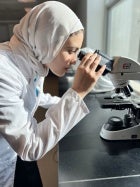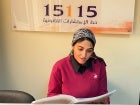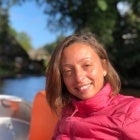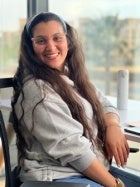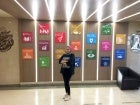Breadcrumb
Stories
Topic
- Economic empowerment (82)
- Gender equality and women’s empowerment (54)
- Ending violence against women and girls (51)
- Entrepreneurship (27)
- 2030 Agenda for Sustainable Development (17)
- Communications and media (16)
- Employment (9)
- COVID-19 (7)
- Climate change (6)
- Education (6)
- Men and boys (masculinity) (6)
- Gender, culture and society (5)
- Gender equality and inequality (5)
- Markets (5)
- Health (4)
- Humanitarian action (4)
- Sustainable Development Goals (SDGs) (4)
- Crisis response and recovery (3)
- Environmental protection (3)
- Gender stereotypes (3)
- Governance and national planning (3)
- Human rights (3)
- Leadership and political participation (3)
- Rural women (3)
- Safe Cities and Safe Public Spaces (3)
- Anti-violence interventions (2)
- Citizen engagement (2)
- Domestic violence/interpersonal violence (2)
- Green economy (2)
- Innovation and technology (2)
- Sexual harassment (2)
- Women with disabilities (2)
- Women’s rights (2)
- Beijing Platform for Action (1)
- Campaigns (1)
- Civil society (1)
- Financing for gender equality (1)
- Generation Equality (1)
- Girls (1)
- Harmful practices (1)
- Information and communications technology (ICT) (1)
- Local development (1)
- Media leadership (1)
- New media (1)
- Peace and security (1)
- Political empowerment (1)
- Social protection (1)
- Sports (1)
- Youth (1)
Country
- Egypt (203)
- Netherlands (2)
- Afghanistan (1)
- Åland Islands (1)
- Albania (1)
- Algeria (1)
- American Samoa (1)
- Andorra (1)
- Angola (1)
- Anguilla (1)
- Antigua and Barbuda (1)
- Argentina (1)
- Armenia (1)
- Aruba (1)
- Australia (1)
- Austria (1)
- Azerbaijan (1)
- Bahamas (1)
- Bahrain (1)
- Bangladesh (1)
- Barbados (1)
- Belarus (1)
- Belgium (1)
- Belize (1)
- Benin (1)
- Bermuda (1)
- Bhutan (1)
- Bolivia, Plurinational State of (1)
- Bonaire, Sint Eustatius and Saba (1)
- Bosnia and Herzegovina (1)
- Botswana (1)
- Brazil (1)
- Brunei Darussalam (1)
- Bulgaria (1)
- Burkina Faso (1)
- Burundi (1)
- Cabo Verde (1)
- Cambodia (1)
- Cameroon (1)
- Canada (1)
- Cayman Islands (1)
- Central African Republic (1)
- Chad (1)
- Chile (1)
- China (1)
- China, Hong Kong SAR (1)
- China, Macau SAR (1)
- Colombia (1)
- Comoros (1)
- Congo (1)
- Congo, Democratic Republic of the (1)
- Cook Islands (1)
- Costa Rica (1)
- Côte d’Ivoire (1)
- Croatia (1)
- Cuba (1)
- Curaçao (1)
- Cyprus (1)
- Czechia (1)
- Denmark (1)
- Djibouti (1)
- Dominica (1)
- Dominican Republic (1)
- Ecuador (1)
- El Salvador (1)
- Equatorial Guinea (1)
- Eritrea (1)
- Estonia (1)
- Eswatini (1)
- Ethiopia (1)
- Falkland Islands (Malvinas) (1)
- Faroe Islands (1)
- Fiji (1)
- Finland (1)
- France (1)
- French Guiana (1)
- French Polynesia (1)
- Gabon (1)
- Gambia (1)
- Georgia (1)
- Germany (1)
- Ghana (1)
- Gibraltar (1)
- Greece (1)
- Greenland (1)
- Grenada (1)
- Guadeloupe (1)
- Guam (1)
- Guatemala (1)
- Guernsey (1)
- Guinea (1)
- Guinea-Bissau (1)
- Guyana (1)
- Haiti (1)
- Holy See (Vatican City State) (1)
- Honduras (1)
- Hungary (1)
- Iceland (1)
- India (1)
- Indonesia (1)
- Iran, Islamic Republic of (1)
- Iraq (1)
- Ireland (1)
- Isle of Man (1)
- Israel (1)
- Italy (1)
- Jamaica (1)
- Japan (1)
- Jersey (1)
- Jordan (1)
- Kazakhstan (1)
- Kenya (1)
- Kiribati (1)
- Korea, Democratic People’s Republic of (1)
- Korea, Republic of (1)
- Kosovo (under UNSCR 1244) (1)
- Kuwait (1)
- Kyrgyzstan (1)
- Lao People’s Democratic Republic (1)
- Latvia (1)
- Lebanon (1)
- Lesotho (1)
- Liberia (1)
- Libya (1)
- Liechtenstein (1)
- Lithuania (1)
- Luxembourg (1)
- Madagascar (1)
- Malawi (1)
- Malaysia (1)
- Maldives (1)
- Mali (1)
- Malta (1)
- Marshall Islands (1)
- Martinique (1)
- Mauritania (1)
- Mauritius (1)
- Mayotte (1)
- Mexico (1)
- Micronesia, Federated States of (1)
- Moldova, Republic of (1)
- Monaco (1)
- Mongolia (1)
- Montenegro (1)
- Montserrat (1)
- Morocco (1)
- Mozambique (1)
- Myanmar (1)
- Namibia (1)
- Nauru (1)
- Nepal (1)
- New Caledonia (1)
- New Zealand (1)
- Nicaragua (1)
- Niger (1)
- Nigeria (1)
- Niue (1)
- Norfolk Island (1)
- Northern Mariana Islands (1)
- North Macedonia (1)
- Norway (1)
- Oman (1)
- Pakistan (1)
- Palau (1)
- Palestine, State of (1)
- Panama (1)
- Papua New Guinea (1)
- Paraguay (1)
- Peru (1)
- Philippines (1)
- Pitcairn (1)
- Poland (1)
- Portugal (1)
- Puerto Rico (1)
- Qatar (1)
- Réunion (1)
- Romania (1)
- Russian Federation (1)
- Rwanda (1)
- Saint Barthélemy (1)
- Saint Helena, Ascension and Tristan da Cunha (1)
- Saint Kitts and Nevis (1)
- Saint Lucia (1)
- Saint Martin (French part) (1)
- Saint Pierre and Miquelon (1)
- Saint Vincent and the Grenadines (1)
- Samoa (1)
- San Marino (1)
- Sao Tome and Principe (1)
- Saudi Arabia (1)
- Senegal (1)
- Serbia (1)
- Seychelles (1)
- Sierra Leone (1)
- Singapore (1)
- Sint Maarten (Dutch Part) (1)
- Slovakia (1)
- Slovenia (1)
- Solomon Islands (1)
- Somalia (1)
- South Africa (1)
- South Sudan (1)
- Spain (1)
- Sri Lanka (1)
- Sudan (1)
- Suriname (1)
- Svalbard and Jan Mayen (1)
- Sweden (1)
- Switzerland (1)
- Syrian Arab Republic (1)
- Taiwan, Province of China (1)
- Tajikistan (1)
- Tanzania, United Republic of (1)
- Thailand (1)
- Timor-Leste (1)
- Togo (1)
- Tokelau (1)
- Tonga (1)
- Trinidad and Tobago (1)
- Tunisia (1)
- Türkiye (1)
- Turkmenistan (1)
- Turks and Caicos Islands (1)
- Tuvalu (1)
- Uganda (1)
- Ukraine (1)
- United Arab Emirates (1)
- United Kingdom of Great Britain and Northern Ireland (1)
- United States of America (1)
- Uruguay (1)
- Uzbekistan (1)
- Vanuatu (1)
- Venezuela, Bolivarian Republic of (1)
- Viet Nam (1)
- Virgin Islands, British (1)
- Virgin Islands, U.S. (1)
- Wallis and Futuna (1)
- Western Sahara (1)
- Yemen (1)
- Zambia (1)
- Zimbabwe (1)
1 - 20 of 210 Results
Pagination
Date:
Defying limitations, Sabreen El-Sayed, 49, embodies the “self-made” success story. Despite lacking a college degree, business experience, and juggling family care for her husband and three daughters, Sabreen dared to dream of running her own business. Fueled by her love for books and computers, she ventured to rent out a small shop in 2012 that would soon turn into her whole world, where she would sell stationary and school supplies, and even offer photocopying and research services.
Date:
The National Council for Women and UN Women Egypt, in partnership with the European Union, will launch a new social media campaign today entitled "Cheer Out Loud". The campaign aims to combat online violence and bullying against female athletes in various sports.
Date:
To mark International Women’s Day 2025 under the theme “For ALL women and girls: Rights. Equality. Empowerment”, the annual "Ring the Bell for Gender Equality” event was organized on Thursday, 20 March 2025 by The Egyptian Exchange - EGX.
Date:
Interview with Ambassador Mervat Tallawy from Egypt on attending the Fourth World Conference on Women in Beijing in 1995 and how the Beijing Platform for Action remains relevant today.
Date:
Suzanne Magdy, a 42-year-old wife and mother of two children: Mohamed (16 years old) and Yousef (13 years old) from Cairo governorate. Suzanne joined her son Mohamed in one of the balanced parentings between motherhood and fatherhood camps organized by UN Women Egypt in partnership with the National Council for Women, and in collaboration with the Institute for European Cooperation and Development (IECD) and Alb Kebeer (Big Heart) Non-Government Organization (NGO) during the 16 Days of Activism against Gender-Based Violence.
Date:
Driven by a strong passion for science, Zeina Mostafa was determined to build a career in biotechnology. As her sophomore year drew to a close, the 20-year-old felt a growing urgency to prepare herself for the competitive professional landscape. Recognizing that she had a critical knowledge gap, Zeina eagerly sought out FEMpower training as a catalyst for her professional development.
Date:
On 8 March 2025, join us to celebrate International Women’s Day under the theme, “For ALL women and girls: Rights. Equality. Empowerment.” This year’s theme calls for action that can unlock equal rights, power and opportunities for all and a feminist future where no one is left behind. Central to this vision is empowering the next generation—youth, particularly young women and adolescent girls—as catalysts for lasting change.
Date:
As Marguerit Tanious ventured out to start her own handbag brand, she did not only want to sell purses, but to create history. She envisioned Bianca as a brand that would weave the rich tapestry of Egypt's 7,000-year history into every exquisite, handcrafted piece. However, the world of high-end fashion demanded more than just artistry. Recognizing the need for strategic marketing expertise, Marguerit turned to Rabeha Joint Programme to help Bianca take its rightful place in the market.
Date:
After years of hard work and late-night studies, Farah Ragab graduated from dentistry and was excited to start her prestigious career. However, to her disappointment, at the age of 28 she found that the road to employment was bumpy and tougher than expected. After countless unsuccessful job applications, she joined UN Women’s FEMpower training to help set her career on track.
Date:
The Ministry of Planning, Economic Development, and International Cooperation together with the National Council for Women and in partnership with UN Women and the United Nations Population Fund (UNFPA) organized a closing ceremony on December 11th, marking the conclusion of “Enhancing Gender Equality and Empowering Women and Girls in Egypt” programme, implemented with the generous support of the Korea International Cooperation Agency (KOICA). .
The closing ceremony brought together Counselor Amal Ammar, President of the National Council for Women; H.E. Younghyon Kim, Ambassador of the Republic of Korea to Egypt; Ms. Marwa Alameldeen, UN Women Country Representative a.i.; Ms. Germaine Haddad, UNFPA Assistant Representative, with a recorded message from H.E. Dr. Rania A. Al-Mashat, Minister of Planning, Economic Development and International Cooperation.
Date:
Nancy Mohamed, an internal lawyer at the Women's Complaints Office (WCO) for 8 years, graduated from the Faculty of Law, Ain Shams University in 2012. She is currently pursuing her postgraduate studies at the Arab Academy for Science, Technology and Maritime Transport, as she is doing her master’s in litigation procedures, in addition to obtaining a diploma in ‘Shariaa’ (Islamic law). Since her childhood, Nancy has been interested in women's rights issues and has always been concerned about the challenges women and girls face in her society.
Date:
In light of the Canadian delegation’s visit to Beheira Governorate yesterday, Dr. Jacqueline Azer, Governor of Beheira, accompanied Canada’s Ambassador-Designate to Egypt H.E. Mr. Ulric Shannon, and a delegation from the Global Affairs Canada and United Nations organizations to Misr Public Library in Damnhour to meet a number of participants of “Rabeha” joint programme. This visit aimed at strengthening the partnership and international cooperation supporting Egyptian women, by presenting successful stories related to entrepreneurship and economic empowerment, in line with the Sustainable Development Goals (SDGs) and Egypt's Vision 2030.
Date:
UN Women, the National Council for Women (NCW), UNHCR, the UN Refugee Agency in Egypt, and the Government of Japan, represented by the Embassy of Japan in Egypt, launched the new phase of the “Humanitarian Response with Sustainable Impact: Sustainable Livelihoods and Social Cohesion” programme in Egypt. The programme, is part of a regional initiative aimed at providing sustainable solutions to refugee, displaced, and host community women in Egypt, Iraq, and Syria.
Date:
On the occasion of the International Peace Day, usually marked on September 21st of each year, and within the context of promoting the United Nations Sustainable Development Goal (SDG) 16―Peace, Justice, and Strong Institutions - the National Council for Women, in partnership with UN Women Egypt and the Spanish government represented by the Spanish Agency for International Development Cooperation, organized the "Women’s Sports for Peace" event to highlight the pivotal role of women in promoting international peace.
Date:
Though Marwa’s beauty salon didn't survive its first year due to a combination of challenges, including lack of experience and financial strain, she remained passionate about the beauty industry. And fueled by her unrelenting spirit, Marwa decided to get back up and try again. This time, armed with the skills and knowledge gained from the beauty care training offered by UN Women.
Date:
After graduating from the Institute of Computer Science, Heba Hussein’s love for all things digital was put on the back burner as she was swept away with the responsibilities of marriage and childcare. However, she did not give up on her passion for exploring technology. Now, at 40, she's pursuing her passion by joining the training on mobile repair offered by UN Women and embarking on an exciting new chapter in her life.
Date:
After years of working in the news broadcasting field, Reem Samir realized that she needed a better work-life balance to be able to raise her twin boys. This goal motivated her to join UN Women’s copywriting training, shortly after which she began a career as a freelance copywriter.
Date:
Youstina Michele, a 29-year-old media creator, has been working in media for six years with the aim of providing a voice for women and raising awareness through content creation. She has worked as a TV and radio presenter on local channels, a social media content creator, and a writer in local newspapers. She’s now expanding her portfolio to include movies, following UN Women’s scriptwriting training.
Date:
From a young girl with ponytails selling snacks and candy in her school playground, to a major wholesaler of clothing and linens, has always been a true trader at heart. With the support of Rabeha Joint Programme , Shrouk, 31, is now working on developing her own application, Yalla Jomla, to reach more customers and level up her business.
Date:
Dina El-Orabi is not your ordinary baker; she is an artist who kneads love into every bite. Her joy comes from feeding others with her mouthwatering creations, from flaky pastries to cakes. To turn her passion into business, Dina decided to launch Deelia’s Kitchen. With the support of Rabeha Joint Programme, she managed to set a strong foundation for her startup and begin her flavorful and delicious journey of success.
1 - 20 of 210 Results





